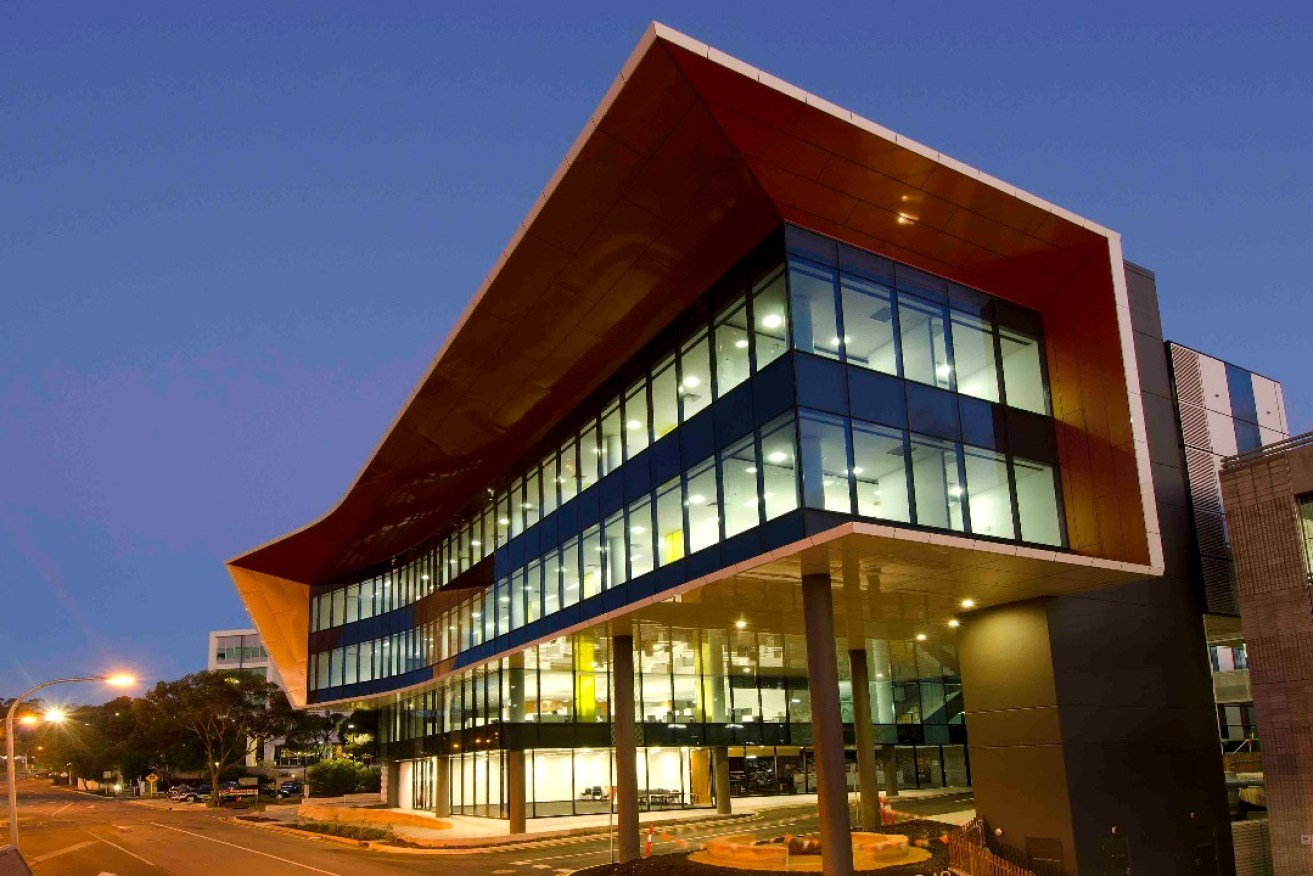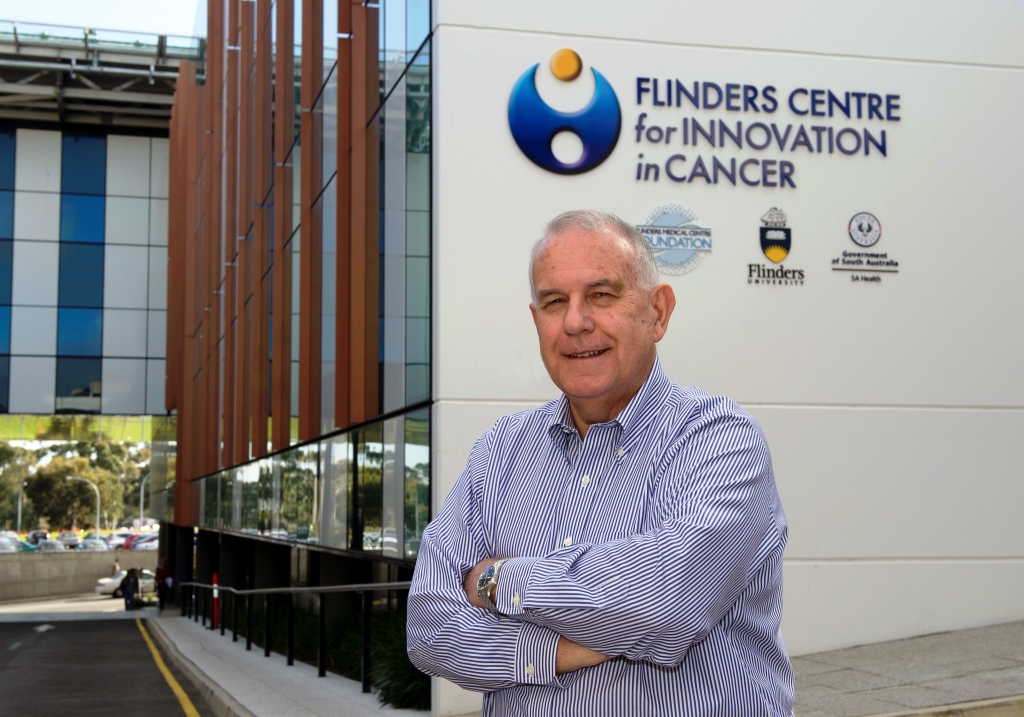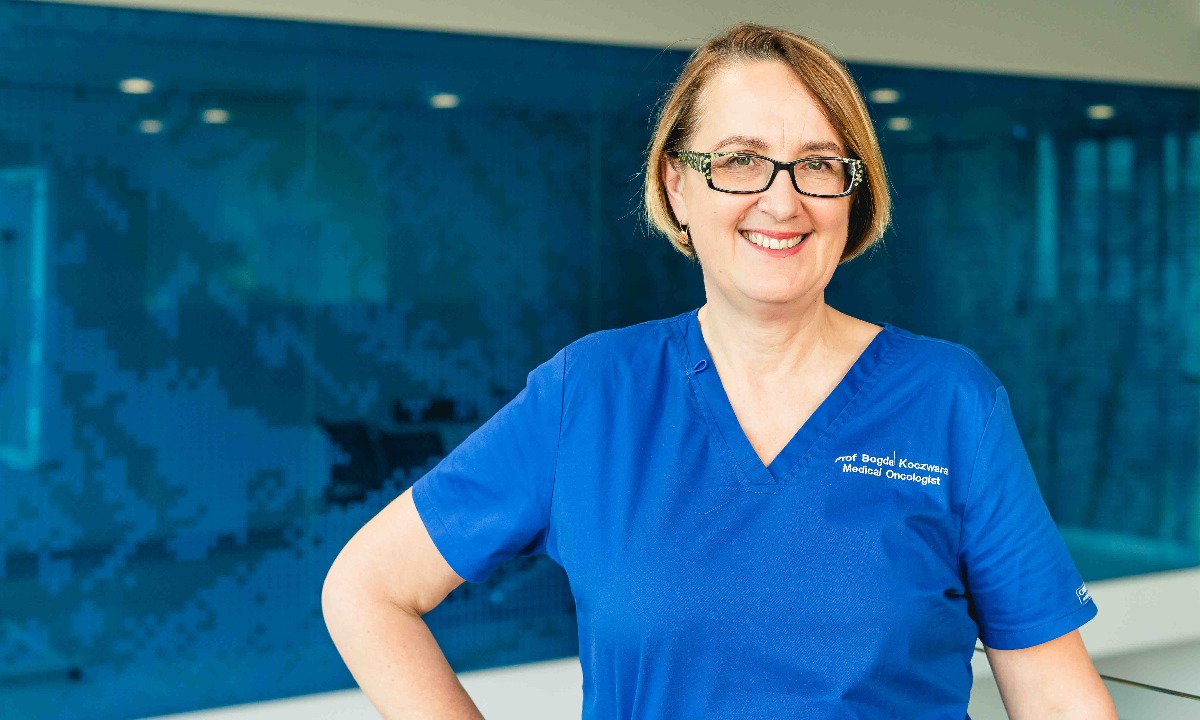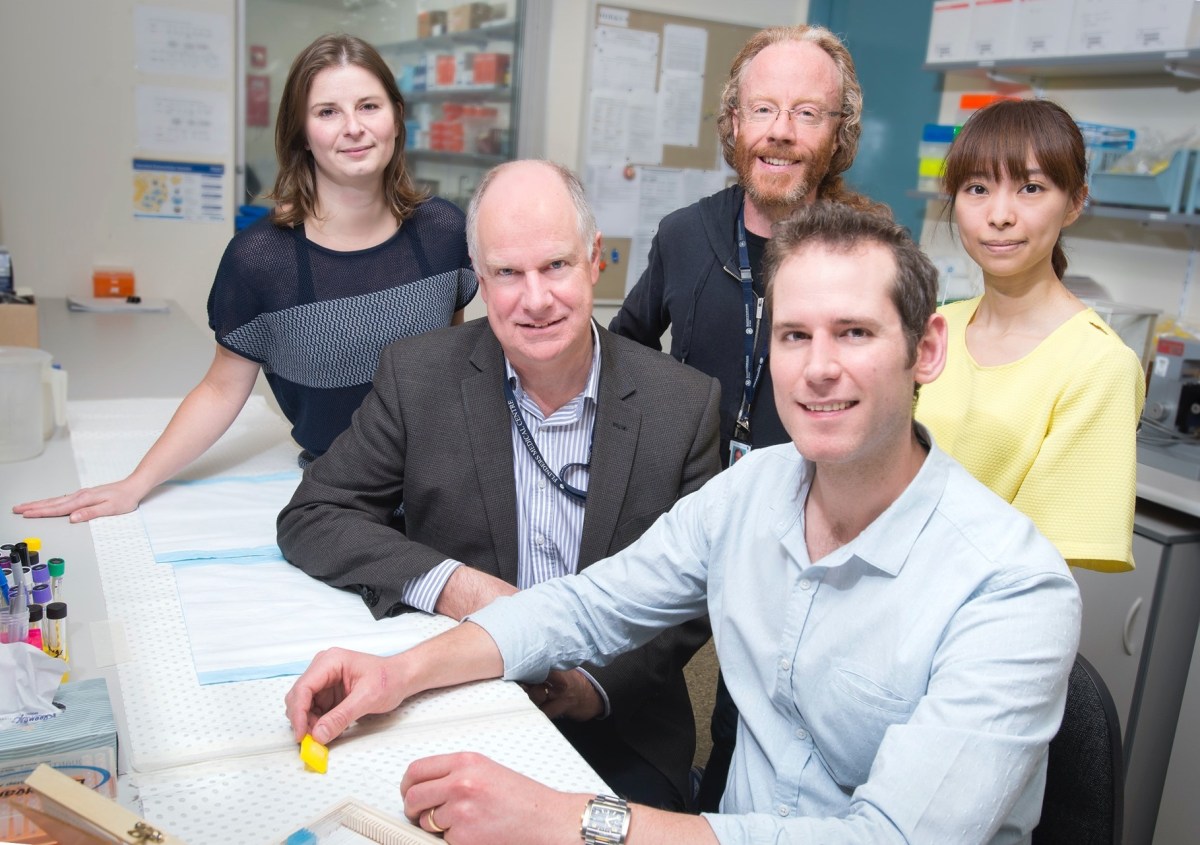Faces of Flinders: The specialists
To celebrate the 10-year anniversary of the Flinders Centre for Innovation in Cancer, we present some of the faces behind this life-changing initiative, including the centre’s specialists such as Graeme Young, Bogda Koczwara and David Watson.

Flinders Centre for Innovation in Cancer.
One man, one vision
In 2012, as Professor Graeme Young admired the façade of a shiny new building perched high on a hill, next to a hospital in Adelaide’s south, he told the throng of onlookers that its rise from the ground was not the end but the beginning.
“Much hard work is ahead of us and when history judges us, we will be judged by the substance from within, rather than the appearances from without,” he prophesised at the launch of the Flinders Centre for Innovation in Cancer (FCIC) in late April 2012.

Graeme Young
Now, 10 years since this maiden speech, Professor Young – a world-renowned gastroenterologist, Member of the Order of Australia and South Australian Scientist of the Year – can look back with pride as his grand plan for South Australia’s first integrated cancer centre accomplishes all its lofty ambitions, and some.
“It’s been a very strong team effort,” Professor Young says.
“It did start with just a couple of people in one sense, but the people who are now working in the Centre are really responsible for the vision coming to fruition because if the people on the ground didn’t do their job well, then our vision wasn’t worth a cracker.
“So yes, I’m incredibly proud of what has been achieved, but what I’m most proud of is the people who are working on the ground and making the vision a reality.
“In 2012 I said I was acutely aware that the building is not the end, but the start of what is to come.
“And I’m delighted in the fact that it’s not remained just a building – it’s now a thriving network of people who are providing the service.”
The start of something amazing
Back in 2002, already with two busy jobs running the gastroenterology research group at Flinders University and the clinical service at Flinders Medical Centre’s Department of Gastroenterology, Professor Young was approached by the then Dean of Medicine Professor Lindon Wing, supported by Flinders Foundation CEO Deborah Heithersay, to take on a third job – the mission of creating the FCIC.
It was his focus on cancer prevention that landed him the tough job of convincing the government, his scientific peers, the hospital, the university and the community to back the concept – and pay for it.
“I remember saying to Lindon Wing ‘why do you want me to be the Director of Development?’ and he said, ‘well, you work in cancer prevention and we want to bring cancer prevention into this’.
“They wanted to make sure this wasn’t just ivory tower research in a laboratory that had no clear prospect of a practical outcome, but a true melting pot, if you like, of all the people involved in cancer.”
Convincing with conviction
Professor Young’s name is synonymous with the FCIC – it was very much he who conjured the vision for the Centre, and as he stoically puts it: “I helped the fundraisers with all their arguments that brought the money in”.
In reality it was a long, hard slog to attract the millions of dollars the FCIC needed to get off the ground, and it was his job to present the many submissions to the state and federal governments of the time, and to the nation’s top echelon of cancer research, the Australian Cancer Research Foundation (ACRF).
“It was a frustrating time. The challenge we faced was that it required university and hospital leadership to be absolutely committed, but neither of them had the funding capability to say, ‘okay, here’s the money to build the centre’.
“Once we had them on board, we still had to go through the difficulties of getting the funding and we also needed the academic blessing that the people who were going to be working in the centre could deliver when it came to the research side of things.”
Between the state, federal and ACRF contributions, it was still at least five years until the first sod was turned. Those years were filled with massive public appeals spearheaded by the Flinders Foundation.
Professor Young said the Foundation’s campaign for the Centre actually “jolted the state” into action on cancer planning and services.
“A year or two after we launched the whole idea back in about 2004 or 2005, the state realised that it needed a state-wide cancer plan.
“I truly believe the state’s vision for a state cancer services network was actually a response to us saying Adelaide has to have cancer centre.”
Mission accomplished
Professor Young says there’s “no question” that the cross-fertilisation of ideas and people within the FCIC has been achieved.
The proof lies in the volume of cancer prevention strategies servicing Adelaide’s southern suburbs, including a program for those at high-risk of bowel cancer that has met the needs of more than 30,000 people in the last decade.
The proof is also in the several hundred publications Professor Young and his teams have produced about bowel cancer prevention through healthy dietary approaches, the way that diet influences the biology of the bowel, and how best to provide screening to the public and high-risk individuals.
Another significant achievement is Professor Young’s internationally-recognised research that contributed to the development of Australia’s National Bowel Cancer Screening Program (NBCSP) – a free, at-home test for eligible Australians aged 50 to 74 years that detects bowel cancer, the second leading cause of cancer death in Australia. The Australian NBCSP followed the screening model developed by Flinders’ research.
Professor Young has also created networks to deliver next-generation bowel cancer screening tests.
Made by Clinical Genomics in collaboration with CSIRO and Flinders University, the potentially life-saving Colvera test was awarded an ‘Oscar’ of science, the Australian Museum Eureka Prize, in 2017.
As he reflects on the past, Professor Young says he is keen for the future to not only include an expansion of the FCIC, but similar models developed across SA.
“I think the way Flinders has done it has history.
“History will say that this is the right way to do it, the right model for Adelaide.”
In 2011, Professor Young was appointed Professor of Global Gastrointestinal Health at Flinders University while relinquishing his clinical appointments. He retired from the university in 2020, and now holds an emeritus and adjunct position and mentors the active research program at the FCIC.
Life after cancer begins at Flinders

Bogda Koczwara
Before Professor Bogda Koczwara joined Flinders Medical Centre (FMC) in the late ‘90s, the notion of cancer survivorship was just that – a notion.
Thanks to her trailblazing efforts since entering the survivorship space in 2008, that notion is now a very real, integrated and integral part of the patient journey at the Flinders Centre for Innovation in Cancer (FCIC), a world-leading cancer centre co-located within the precinct shared by FMC and Flinders University.
Instrumental in developing the survivorship focus at FMC and, later, at the FCIC, which is now a leader in the field, Professor Koczwara also established the oldest cancer survivorship conference in the world.
“Having a cancer diagnosis changes your life forever and creates a list of concerns, worries and needs that need to be appropriately addressed,” says Professor Koczwara, who is a senior staff specialist at FMC, Professor of Medical Oncology at Flinders University and lead in survivorship for the SA Health and Medical Research Institute’s Comprehensive Cancer Consortium.
“When the Centre was being created, there was growing recognition that cancer survivors have many unmet needs,” she says.
“More and more of our research and that of others was showing that cancer survivors are at risk of adverse outcomes including premature death, disability, unemployment and higher healthcare costs.
“The conventional system of cancer care delivery was just not focused on those issues so we developed a partnership with Professor Patricia Ganz at UCLA, the authority on cancer survivorship. She served as a guide to how we have modelled survivorship services at Flinders from its inception.”
World’s oldest suvivorship conference
Professor Koczwara says her biggest achievement at Flinders has been establishing the Cancer Survivorship Conference.
Since 2013, the biennial conference has brought together clinicians, researchers and survivors from across Australia to understand and address the issues facing cancer survivors and the priorities for survivorship care and research.
“The survivorship conference is by far the most important in my experience in cancer at Flinders because it has solidified our relationship with cancer survivors and advanced issues relating to life after cancer,” Professor Koczwara, who convenes the conference, says.
“We have progressed research into areas that previously had been under-recognised and we’ve developed long-lasting relationships with people affected by cancer.”
Mexican wave, from Flinders to Texas
Before the conference went national, a smaller, local affair was held in 2011. That event, Professor Koczwara recalls, featured a virtual Mexican wave from a Flinders lecture theatre to the LIVESTRONG Foundation HQ in Austin, Texas.
“A long time before Covid and online connections, we had an online connection with the cancer survivorship group at LIVESTRONG, which was established by cancer survivor Lance Armstrong.
“One time we did this amazing Mexican wave; they waved to us from Austin and we waved to them from one of the lecture theatres at Flinders – it was a lot of fun.
“And at the very first national survivorship conference in 2013, we were standing on the lawn outside the Stamford Grand in Glenelg and there was this huge group of people, some of whom are not with us today but who have left a lasting legacy; one being Ashleigh Moore.”
Ashleigh Moore led Cancer Voices SA in 2007, a volunteer organisation dedicated to making a difference to cancer outcomes and improving the patient journey through advocacy, knowledge exchange and community involvement.
In 2012, Ashleigh was awarded an Order of Australia Medal (OAM) for services to the community through Cancer Voices SA. Chris Christensen led the organisation from 2017 until her death in 2020.
Professor Koczwara says Ashleigh and Chris made a profound impact on the development of the FCIC: “They gave their life for what they believed in, and their advocacy efforts were intricately connected to the Centre.”
The future of survivorship
Having accomplished so much since the FMC survivorship program hit the ground running in 2009, Professor Koczwara says there is still plenty of work to do.
“We have the oldest cancer survivorship conference in the world and some great global partnerships, but we want to expand on those connections to remain relevant not just in Adelaide and Australia, but around the world.
“We also need to ensure the Centre itself is as responsive to patient needs as it was designed to be so that we remain responsive, interested, and holistic in the care and research we deliver.”
As the FCIC marks its 10th year in 2022, Professor Koczwara says the legacy is not about the building but the people within it – a sentiment echoed by her colleagues.
“So many talented people have come through the Centre that we’ve trained and supported, who are outstanding clinicians and researchers today in Adelaide and elsewhere.
“Investing in the legacy of an initiative, it’s not the building, it’s the people. And there have been some amazing people that have come through the doors who have really made a difference.”
Beyond a building

David Watson
The Flinders Centre for Innovation in Cancer (FCIC) represents the physical presence of a united cancer front that transverses many people and places, says oesophageal cancer expert Professor David Watson.
As Head of the Discipline of Surgery at Flinders University since 2002, Professor Watson was involved in the initial campaign to create the FCIC, which now serves as an anchor for the raft of cancer activities spanning the university and nearby Flinders Medical Centre.
Instrumental in forming the Flinders University Cancer Control Alliance in 2006, which later became the Flinders Centre for Cancer Prevention and Control, and eventually embedded in the fabric of the FCIC when it opened in 2012, Professor Watson says Flinders’ cancer operation goes beyond the building.
“The cancer centre is the people, not the building, and the collaborations that occur between the various groups within the university and the health service on the Bedford Park footprint,” Professor Watson says.
“The concept of the building was to provide more infrastructure, a more strategic focus and more visibility, but the majority of cancer research and treatment doesn’t actually happen in the building.
“What the Centre does do is provide more visibility.
“And with surgeons, medical oncologists, dieticians and other clinicians consulting in the building, it also allows some patients to be seen by multiple specialists at the same time, rather than having to come back and forth for multiple appointments.
“That’s a significant plus from the patient perspective.”
Beat cancer project
Professor Watson, who pioneered the development and evaluation of laparoscopic surgery for gastro-oesophageal reflux, disorders and cancer, is responsible for injecting millions of research dollars into the Centre over the past decade.
One of these projects, co-funded by Flinders Foundation and, from 2018 to 2021, through the Cancer Council’s Beat Cancer initiative, aims to improve clinical standards for oesophageal and bowel cancer screening, prevention and treatment.
His research focuses on pinpointing patients at low and high risk of oesophageal cancer based on key indicators including age, gender and microscopic changes in the oesophagus. By removing very low-risk patients from unnecessary endoscopy surveillance, resources can be better focussed where needed, and clinical practice will be more cost-effective, he says.
“Our work, which has been integrated with health economics groups, has determined that current clinical practice in Australia and indeed around the world is essentially wasting resources and money.
“So we’ve built mathematical models of clinical practice, screening and surveillance to better target resources to the people who really are at high risk of cancer, and not waste resources on individuals who are unlikely to get a problem.
“Between five and 10 per cent of people with Barrett’s oesophagus will actually get cancer so if you can find the ones that will never get cancer and get them off the surveillance programs, you can save a huge amount of money and free up resources that can be used for other things.”
In the future, Professor Watson says the aim is to develop blood tests and tissue-based biomarkers to detect cancer early and predict recurrence, potentially negating the need for endoscopies and rewriting the standard for clinical practice around the world.





